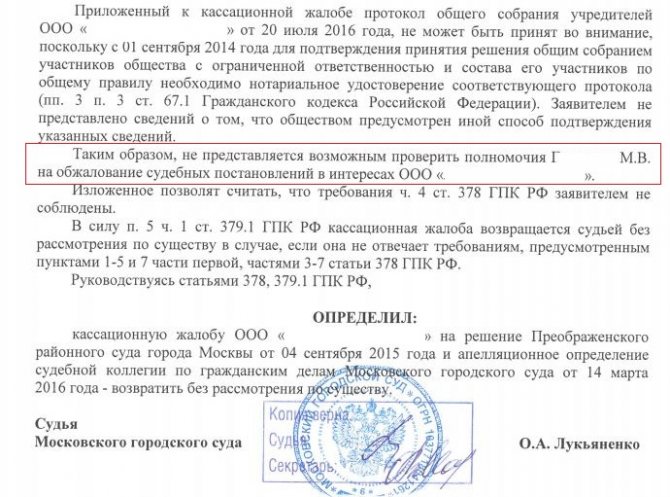Peculiarities
Article 321 of the Code of Civil Procedure of the Russian Federation provides for the possibility of appealing against a decision made by a judge by filing an appeal. Thanks to this document, any of the parties has the opportunity to appeal the court decision, but provided that it has not entered into legal force. The document with which this is done is called an appeal and it is sent exclusively to the judicial body that made this particular decision.
Information on how to properly file an appeal can be found here.
However, quite often clarifications and new information appear that need to be included in an already filed appeal. The legislation of the Russian Federation allows this to be done. Moreover, the court has no right to refuse to accept these documents. From now on, the appeal will be called clarified or supplemented.
The main requirements
to this document are the following:
- All information provided in the appeal addendum must be compiled in accordance with the complaint itself. It is understood that the document itself must be formatted identically to the appeal.
- It is strictly prohibited to introduce any new requirements into the text of the addendum if no conditions for them have arisen in the process of studying the case by the court of first instance. This requirement is regulated by Part 2 of Article 322 of the Code of Civil Procedure of the Russian Federation.
It should be remembered that there is no law that specifically determines the time limit for filing a supplement to an appeal.
Due to the fact that judicial practice is quite contradictory on this issue, the deadlines can vary significantly. For the most part, courts tend to equate additions to the appeals themselves, and therefore the deadlines for filing them become identical. Taking an appeal as an example, the deadline for filing an amendment is 30 days after the results of the court hearing (and not from the moment the citizen filed the appeal itself).
At the legislative level, there is no specific deadline for submitting an amendment, which means that this document can be submitted at any time. But only before the complaint is submitted for consideration to the appellate authority. That is, before the start of the court hearing (no later than 5 days) on this issue.
Limits of refinement
The appellants, in their clarifications to the appeal, cannot refer to new evidence that was not examined by the first instance. The exception is cases when certain new circumstances and evidence could not be presented to the court of first instance for objective reasons.
Of course, referring to new evidence, the appellant will need to prove the objectivity of the reasons why they were not stated at the first instance.
To a certain extent, clarifications to the appeal and additions to it are homogeneous phenomena. The exception will be additions to so-called short (preliminary) complaints. In these cases, the additional appeal is, in fact, the only motivated one, since the preliminary complaint does not contain any motivation.
This is important to know: Time limits for consideration of a complaint by bailiffs

As for clarifications, they are always submitted in addition to a previously filed motivated complaint, provided that it omitted some points that are essential for a full and objective consideration of the case in the second instance.
How to correctly draft an addendum to an appeal?
Judicial practice shows that an appeal against a court decision can quite often change the results of a court case in favor of the participant in the process who filed the complaint.
If you approach the preparation of the addition with maximum responsibility, then the appeal may not only be granted, but also the consideration of the case may be completely abandoned. If there is information that is extremely important to add to the text of the appeal, an addition must be submitted. This will help the appellate authority make the right decision. Often, in your favor.
The most important thing when drawing up an addendum to an appeal is the correct
execution of
the document:

1. First fill out the upper right part of the paper:
- designation of the court to which the appeal was sent;
- FULL NAME. applicant (no abbreviations);
- address of permanent registration when the document was drawn up and submitted (appeal);
- the name of the court that made the judgment;
- case number;
- complete information about the parties to the court case (defendant, plaintiff);
- the main essence of the claims.
All this information can be safely taken from the “header” of the appeal, since the data is completely identical.
2. The main part of the document indicates its title: “Addition to the appeal in a criminal/civil case.” Then it is reported that this document is an addition to the previously filed appeal.
After this, the text of the appeal is copied in full. However, from now on this document will indicate new evidence that was not presented in the court of first instance. It is important to emphasize that the reasons why evidence was not provided on time are valid. And the reasons themselves should be indicated in the form of justification at the end of the document.
You cannot make new demands regarding a court case that have not been previously voiced. The basic information in the text of the document must be completely identical to the appeal in view of the fact that this document is only a way to supplement the evidence in the case.
The quality of execution of an amended appeal is directly proportional to the result. The more responsible you are in filling out the document, the greater the chance that the results of the case will be in your favor.
3. At the end of the document, the signature of the applicant and the date of drawing up the addition to the appeal are placed.
sample addendum to an appeal in a criminal case in .doc (Word) format The completed addendum must be submitted in person (not by mail) to the appellate office.
Also, do not forget that it is necessary to attach copies according to the number of persons/parties involved in the case. The appellate authority will hand them over with its own hand, freeing the applicant from unnecessary movements.

Addendum to the preliminary complaint
Any decision made by a court in a civil case may be appealed on appeal within one month from the date of its proclamation.
Failure to comply with the one-month deadline entails refusal to accept the appeal. This period also includes the five days allotted by law for the judge to write a reasoned decision, after which the civil case must be submitted to the office.
Often, especially in complex cases, judges do not meet the five-day deadline, and the parties who came to familiarize themselves with the reasoned court decision and the minutes of the court hearing cannot do this. As a result, with each day of delay, the period for appeal is reduced.
Usually judges solve this problem peacefully. They inform the parties that the preparation of the decision or the preparation of the protocol of the court session is delayed, and that the period for appeal will be calculated by them from the moment the parties become familiar with the case.
That is, in essence, the judges unofficially extend the period for appealing with the condition that the complaint will formally include a date corresponding to the one-month period. To be fair, we note that delays in submitting cases to the office are almost always caused by objective reasons, mainly the enormous workload of judges.
Parties who believe that they should not rely on the judge's word and want to secure a period of appeal file what is called a brief or preliminary appeal. Usually such complaints are extremely laconic. They contain a minimum of information, namely:
- name of the court to which the appeal is filed;
- Name and address of the appellant;
- Full name and address of the opposing party;
- brief information about the case considered - plaintiff, defendant, name of the court that made the decision, date of the decision;
- unmotivated disagreement with the court decision, for example, “I do not agree with the decision of the Oktyabrsky District Court of the city of Barnaul dated November 11, 2022, on the grounds that I will set out in a reasoned complaint after reading the court decision and the minutes of the court hearing”;
- date of sending the preliminary complaint;
- appellant's signature.

A preliminary (short) complaint is intended to “stake out” procedural deadlines. That is, the appeal will be considered filed on time, but an additional (reasoned) one can be filed after familiarization with the court decision.
However, it should be remembered that a preliminary complaint is still a complaint, which means that no one will wait for a reasoned addition to it. If a motivated complaint is not filed within a reasonable period of time, then the case will be sent to the appellate authority with the complaint that exists, that is, with a preliminary one.
To avoid the risk of consideration of an unmotivated complaint, the appellant can do one of the following:
- simultaneously with filing a preliminary complaint, send an application to the court with a request to notify it of the date the decision is made;
- independently monitor the delivery of the case to the court office;
- draw up an additional appeal after sending the case to the appellate authority. In this case, having received notice of the appointment of the case for hearing, the appellant should urgently go to the appellate authority, familiarize himself with the case there and apply for a postponement of the hearing due to the need to file an additional complaint.
Neither the court of first instance nor the appellate instance can refuse to accept an additional complaint, since, in accordance with Art. 35 of the Code of Civil Procedure of the Russian Federation, the parties have the right to appeal court decisions.
Legal tricks of the appellate supplement
In addition to the main goal of supplementing the appeal, this document can be used to create difficulties for opponents:
- Once the other parties receive a copy of the addendum, they can review it and then prepare for the next court hearing in a calm and calm manner. By being prepared to parry your evidence, they will have serious tools to win in court.
- However, if the addition to the appeal is submitted to the appellate instance 5 days before the meeting (Part 4 of Article 389.8 of the Code of Criminal Procedure of the Russian Federation), then the judges will have time to familiarize themselves with it. Unlike opponents.
- During this time, it is almost impossible to provide copies of the document to other parties. In this situation, copies can be provided to other participants only during the meeting itself.
- The opposing side will chaotically study the materials and additions to the complaint, check the document for small details, etc.
In such a stressful situation, it is extremely difficult to fend off new arguments.
This will play into your hands and help convince the court that the case should be considered in your favor. When the addition is drawn up correctly, without errors, and there is justification for new evidence, the court will take this into account. If you do not plan to interfere with your opponents, but just want to supplement your complaint, then it is better not to delay submitting the document to the appellate court.
How to send an addendum to a complaint
There are some specifics in this regard:
- An additional complaint and annexes to it are prepared in quantity according to the number of participants in the process + a copy for the court.
- Depending on the type of process, copies of materials are sent by the person filing the complaint (directed, handed over) to other participants in the process independently or transferred to the court, which itself resolves this task.
- If the materials on the main complaint are still in the first instance, then the addition is sent here, but if they have already gone to the appellate instance, it is advisable to send them directly to the appeal.
The supplement is submitted to the court in person, sent by mail, courier or electronically - everything is as usual.
Some legal tricks of applying an addendum to a complaint
Lawyers often use an additional complaint as a tool to solve their problems. In this case, the main complaint is simply a way to indicate intentions and complete formalities. It is drawn up briefly, superficially, and the main goal is for the complaint to simply be accepted. The main emphasis is on the additional complaint:
- The supplement carefully sets out the position on the case, citing all the arguments and evidence that were often deliberately not included in the first complaint.
- The possibility of operating with appeal deadlines is being studied, taking into account the practice of specific courts of first and appellate instances. The task is to make sure that the court accepts the addition, but at the same time the other party to the process does not have time to prepare objections (revocation), develop their position, counter-arguments and evidence. As a rule, in this case, you need to file an addition in the period between the end of the appeal period and 5 days before the first hearing of the appellate court. In order to comply with the requirement to send copies to other participants in the process, materials are handed over in person, sometimes almost on the day of the meeting itself or the day before.
If there is no goal to complicate the life of your opponents, then it is better not to take risks with deadlines and compliance with formalities - prepare the supplement within the deadline for appeal and send it in the usual manner. In order to use the complaint supplement tool correctly and prudently, you need experience in this matter.
This is important to know: Complaint about the inaction of the bailiff: sample 2021
How to file an appeal against a district court decision
An appeal is filed with the court that made the contested decision. There is no need to send documents to a higher court yourself.
https://www.youtube.com/watch?v=ytcreatorsru
When filing an appeal, personally mark the acceptance of the documents by the office employee on your copy of the complaint, which you must take with you to court. If the complaint is sent to the court by mail, do so by certified mail with return receipt requested. Then it will be known when the documents were received by the court.
A prerequisite is to attach copies of the complaint according to the number of persons participating in the case. The appeal is paid by the state fee, the original receipt is also attached. There is no need to attach documents that are already on file. The appellate court will examine the entire civil case.

The progress of the appeal should be monitored. If the complaint is left without progress, it is necessary to promptly obtain a copy of the court ruling and make the necessary amendments within the prescribed period. When returning the appeal, the court also issues a ruling indicating the reasons for such a procedural action.
It should be borne in mind that magistrates have the right not to draw up a full decision without a statement from the persons participating in the case. Therefore, within 3 days from the moment the operative part of the decision is announced by the magistrate, it is necessary to submit an application for drawing up a reasoned decision.
Based on the results of consideration of the appeal against the court decision, the district court issues an appeal ruling, which can only be appealed to the cassation instance.
Art. 321 of the Code of Civil Procedure of the Russian Federation provides for the possibility of appealing a decision made by a judge by filing an appeal. Thanks to this document, any of the parties has the opportunity to appeal the court decision, but provided that it has not entered into legal force.
Lawyers are familiar with many cases when, after filing an appeal in a civil case, new facts are discovered, or it turns out that some important point was missed. In such situations, only one question is of interest: “Is it possible to add such information to an already existing act?” Yes, Article 322 of the Code of Civil Procedure of the Russian Federation provides for such actions.

Addendum to the appeal
The court has the right to refuse to accept this application if it is unfounded. This type includes:
- Additions containing information that contradicts the originally submitted appeal.
- In time before the trial, it was established that the act did not correspond to the real events.
- The request to assign liability does not comply with the law and is overstated.
- The deadline for submitting clarification has been missed (the pre-trial investigation will not have time to verify the authenticity of the document and information).
Note! The addition to the appeal is very important, and is necessary primarily for the person who filed the main appeal, since during the period from the opening of the appeal, new arguments and witnesses may appear that can contribute to a quick and correct conclusion.
The law of the Russian Federation does not indicate the exact time frame for writing the addition. You need to focus on something else. Since according to the rules there is a set 30-day period for filing the main appeal, lawyers recommend submitting clarifications to the document (if any) during this period. The main thing is no later than 5 days before the start of the arbitration court hearing on the appeal case.

There are a number of requirements for writing any type of documentation. Clarifications to the appeal are no exception. Most often, when going to court to write an addition to an appeal in a civil case, the commissioner issues a form that has mandatory fields. What points should you pay attention to and fill out in order to submit your application correctly? Here are the main ones:
- The name of the authority to which the clarification is sent (the full name of the court, type, and district affiliation is indicated).
- Full name and address of the applicant (registration and actual place of residence).
- The body whose decision is being appealed.
- The following describes the information that needs to be clarified and added to an existing appeal.
- Upon completion, the date, full name and signature of the applicant are indicated (corresponds to the signature in the passport).
Important! Correct drafting of a document is one of the main factors in the court making a positive decision in favor of the applicant. Therefore, you should take its design seriously and responsibly.
There is no legally established period for considering an addition to an appeal in a civil case. After submitting clarifications, the court is obliged to adopt this act as soon as possible. Next, the document is transferred for pre-trial investigation to establish its correctness and confirm that the information corresponds to real events.
If this process cannot be completed before the date set by the court for consideration of the appeal, the court has the right to postpone it indefinitely. After conducting and clarifying all the nuances of the case, the pre-trial investigation draws up a report on the work done and sends it back to the court. Based on the availability of all documents, a new date for consideration of the case is set.

Consideration of the supplement
After accepting and including an addition to the appeal in a civil case, the commissioner is obliged to send a copy of the document for review to the persons participating in the case.
It should be noted that the law does not establish specific deadlines for filing this application. Depending on the type of case being considered, the law sets specific deadlines for filing the appeal itself.
When considering a criminal case, a complaint may be filed no later than
10 days

after the decision has been made.
When considering a civil case, an application for appeal can be sent within
30 days after the verdict.
When considering an arbitration case, the applicant has the right to file an appeal within
30 days after the court makes a decision.
If these deadlines were violated by the applicant for a good reason, then he has the right to send an application to the court with a request to accept the appeal after the established deadlines.
https://www.youtube.com/watch?v=ytcopyrightru
Additions to the appeal can be filed at almost any time, since the law does not provide any restrictions in this regard. However, it is necessary to take into account a number of nuances.
The court needs time to study and consider the addition to the appeal.
In some cases, participants in the process will need time to file various objections to the appeal, as well as additions to it.
If an addition to the appeal is filed shortly before the start of the trial, the court may reject it or postpone the hearing.
Therefore, the addition to the appeal must be thought out, drawn up and filed, taking into account the time required for its consideration.
Such a statement should be drawn up taking into account the following nuances:
- the statement should indicate only those facts, circumstances and claims that were not mentioned directly in the complaint itself;
- during the court hearing, only information that was not indicated in the initial application for a good reason will be taken into account;
- all claims in the document must be drawn up in accordance with the law.
All arguments that the applicant deems necessary to present in this document must be based on evidence already available in the case.
If you need to submit this document, you must take into account that when considering criminal cases, the appeal period is only 10 days. Therefore, the addition to the appeal should be sent directly to the appellate authority as soon as possible.
When filing an addendum to an appeal against a decision made in the arbitration process, the applicant himself is obliged to ensure that all participants in the process receive this document. It is recommended to send the paper by mail, with acknowledgment of receipt. An addition to the appeal allows interested parties to inform the court about the circumstances of the case that became known after the verdict was passed and the application for appeal was sent.







